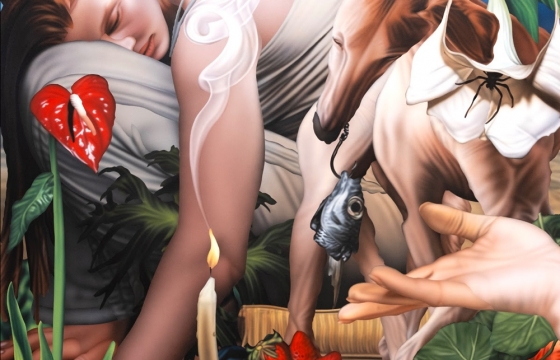In Suspended Daydreams, Atlanta-based artist Alic Brock presents a collection of dreamlike work that blur the road between fantasy and actuality at Richard Heller Gallery. In moments of private and societal instability, Brock explores the refuge of the creativeness—its skill to assuage, distort, and typically disorient. These works recommend that whereas daydreams supply crucial escape, additionally they carry a warning: if we linger too lengthy in unreality, we might turn out to be unmoored from the strangeness of the world round us.
The exhibition options acrylic work made utilizing Brock’s signature airbrush method. Working with ultra-precision, he “chops and screws” his subject material—starting with digital manipulation of discovered and private imagery, then translating these distortions into painted type. Skewed stencils, layered collage, and saturated shade mix to create scenes that really feel suspended in time and thought: fractured, fluid, and emotionally charged.
This physique of labor was formed by a interval of profound transition: the passing of Brock’s mom, and shortly after, the start of his son. These twin occasions—experiencing each grief and new life—supplied a brand new lens on reminiscence and storytelling. Studying easy image books to his son prompted Brock to contemplate the sorts of visible tales he would possibly create—ones that really feel accessible on the floor however resonate with deeper emotional undercurrents.
Born in 1992 in Dayton, Ohio, Alic Brock is a self-taught artist who lives and works in Atlanta, Georgia. His apply typically attracts on popular culture—that includes athletes, musicians, and sometimes art-historic figures like Man Ray—remixed by means of a strategy of digital and guide manipulation. With repetition, inversion, and a vibrant shade palette, Brock’s work turn out to be meditations on visible transmission and the blurred channels of up to date communication.
In Suspended Daydreams, Brock invitations viewers right into a liminal area—a quiet, shimmering in-between—the place the private, the cultural, and the imagined overlap.
